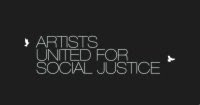
Fittingly we arrived in Port au Prince, Haiti, at midnight under a full moon. And that was about the only light we saw. The electrical system had been destroyed by the earthquake in most of the city so the airport terminal was dark and there were no lights on the tarmac. We unloaded our cargo in the dark with only the surgeon's hand lamps and a few flashlights to illuminate our bags and boxes of medical supplies.
I had gone to Haiti to investigate human trafficking and to bring medical supplies, funds, and teddy bears, to people who had lost everything in the worst natural disaster I'd ever seen. While Artists United for Social Justice, www.AUSJ.org, is focused on combating trafficking, we are also involved in humanitarian relief work. I flew down with the medical teams volunteering at the University of Miami field hospital and stayed with them for 10 days. I had worried about including teddy bears in the precious cargo space, but after seeing news reports showing tiny children with only the clothes on their backs trying to sleep in tent hospitals, I just wanted to give them something cuddly to hold on to so they could fall asleep. When I distributed the bears to the kids in the pediatric field hospital the smiles I got in return were worth the whole trip.
The human trafficking problem in Haiti has a unique twist in that there is a socially accepted system whereby children from poor families are often given to wealthier families with the understanding that the wealthier family will provide for the child in exchange for the child working for them. These children are known as restavecs. This well established "minding the child" system was brought over from Africa and initially seems to have served its purpose and was benign. However, over time the system evolved into an abusive one where the children are not educated and are simply unpaid child labor. In addition to working long, sometimes 20 hours long, days, many children are beaten and sexually abused. Sometimes children are sold into the restavec system and blatantly trafficked.
I was able to speak with people at UNICEF, World Vision and other NGOs about measures to stop the child trafficking. AUSJ is part of the UNICEF Child Protection sub-cluster working group on trafficking and abduction. I met with the Chief of Police at the JOTC headquarters in the UN compound to discuss what he was doing to protect the children and orphanages. He gave me the hot line number which is manned 24/7 for emergencies. While the Chief assured me they would respond to any emergency he also told me he had lost more than 75% of the police force to the earthquake, and they are now partnered with the UN peace keeping force in order to be able to respond. I was able to give the hot line number to the orphanages, but obviously much more is needed on all fronts. AUSJ is returning to investigate solutions to trafficking, implement training and tracking programs and will continue relief efforts. Please support our efforts to make a difference where it's need most.
Sandra Kirkpatrick
Executive Director, Artists United for Social Justice






No comments:
Post a Comment